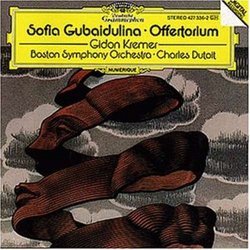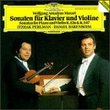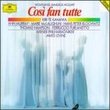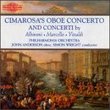| All Artists: Christine Whittlesey, Tabea Zimmermann, David Geringas, Alois Posch, Eduard Brunner, Klaus Thunemann, Radovan Vlatkovic Title: Sofia Gubaidulina: Offertorium (Concerto for Violin & Orchestra, 1980) / Hommage à T.S. Eliot, for Octet & Soprano (1987) - Gidon Kremer / Charles Dutoit Members Wishing: 1 Total Copies: 0 Label: Deutsche Grammophon Release Date: 7/20/1989 Genres: Pop, Classical Styles: Vocal Pop, Opera & Classical Vocal, Forms & Genres, Concertos, Historical Periods, Classical (c.1770-1830), Instruments, Strings Number of Discs: 1 SwapaCD Credits: 1 UPC: 028942733626 |
Search - Christine Whittlesey, Tabea Zimmermann, David Geringas :: Sofia Gubaidulina: Offertorium (Concerto for Violin & Orchestra, 1980) / Hommage à T.S. Eliot, for Octet & Soprano (1987) - Gidon Kremer / Charles Dutoit
 | Christine Whittlesey, Tabea Zimmermann, David Geringas Sofia Gubaidulina: Offertorium (Concerto for Violin & Orchestra, 1980) / Hommage à T.S. Eliot, for Octet & Soprano (1987) - Gidon Kremer / Charles Dutoit Genres: Pop, Classical
Russian composer Sofia Gubaidulina's Offertorium is both a violin concerto composed for Gidon Kremer and a set of variations based on the so-called royal theme from Bach's Musical Offering. Gubaidulina is an interesting ... more » |
Larger Image |
CD DetailsSynopsis
Amazon.com essential recording Russian composer Sofia Gubaidulina's Offertorium is both a violin concerto composed for Gidon Kremer and a set of variations based on the so-called royal theme from Bach's Musical Offering. Gubaidulina is an interesting composer, belonging to no school and avoiding all compositional fads. Her style is sparse, even austere, but her expert use of instruments and instrumental color reveals her experience as a professional composer of film scores. Offertorium is mostly meditative, sad, and frequently quite dissonant, though there is an intensely lyrical passage at about 17 minutes, and in the last seven or eight minutes of the piece, the soloist and orchestra engage in a dialogue of rapt beauty. The Hommage to T.S. Eliot was inspired by the composer's encounter with Eliot's Four Quartets. Scored for the same combination of winds and strings as Schubert's Octet, plus soprano, the piece is even more sparely composed than Offertorium and a much tougher nut altogether. There's no question, though, of Gubaidulina's sensitivity in setting Eliot's poetry, and both works are superbly performed by the players for whom they were written. --David Hurwitz Similar CDs
|
CD ReviewsAlong the mistaken path the_drone | 05/01/2000 (5 out of 5 stars) "While still a student at the Moscow Conservatory, Sofia Gubaidulina was already marked as a composer pursuing a "mistaken path." Dmitri Shostakovich, who was among those that evaluated her final examination, supported her with these words: "I want you to continue along your mistaken path." Sometimes compared to Alfred Schnittke, Gubaidulina is less playful, more methodic in her compositional approach and, ultimately, more rewarding. Offertorium is very special. It's an unorthodox concerto for violin, whose first part unfolds as a set of variatons on a theme by Bach/Webern. Webern created a kaleidoscopic orchestral version of Bach's Royal theme from The Musical Offering. And it is Webern's orchestral treatment, not Bach's original version, which serves as the Offertorium's point of departure. Gubaidulina finds her roots in these two composers and her concerto is an offering: a work offered in sacrifice. With each new variation, the theme is shortened by one note at the beggining and one at the end, until the work is reduced to one note. Thus begins the second section of the concerto, where the theme is reconstructed from this single middle note and made whole again. This recreation of the musical theme in reverse creates an otherwordly effect that also produces an intense emotional impact on the listener. "Nothing can be sole again" wrote Yeats, "that has not been broken." This work, commissioned by the performer--Gidon Kremer--, is the compelling portrait of the soul of modern Russia." Masterpieces of poise and insight Christopher Culver | 11/16/2004 (5 out of 5 stars) "Sofia Gubaidulina, now recognised as one of the great living composers, is known for her deep spirituality and dedication to her own path away from trends, and this disc, first released in the early 90's and now available reissued in DG's "Echo 20/21" line, highlights this profundity and uniqueness well. Gubaidulina's "Offertorium" is an exploration of the Royal Theme from Bach's "Musical Offering", using Klangfarbemelodie as Webern did in his orchestration. The theme is played nearly complete, is deconstructed note by note, hangs auspiciously absent, and then is mesmerizingly reconstructed as a Russian Orthodox hymn. The violin is at the core of this work, as it is a concerto dedicated to Gidon Kremer, but there are also very prominent contributions from the horns and drums. I find that this piece is an excellent introduction Gubaidulina's oeuve because it highlights the composer's tendency to meditative concentration broken by the rarest of powerful and shaking movements. However, while the work here is performed by its dedicatee, the sound quality is poor and the percussion oddly performed, so I would recommend the recording on BIS with Oleh Krysa over this. The "Hommage a T.S. Eliot" is an exciting piece, here performed by a small ensemble selected by Gidon Kremer. Gubaidulina wrote the homage after reading the Eliot's "Four Quartets", often considered the poet's masterpiece and one of the finest works of spiritual poetry of the 20th century. The homage consists of seven parts. The beginning two part are instrumental only. The first is with strings, a slow and tranquil exploration of sound very characteristic of Gubaidulina's "String Trio". The second is for horns, already much more energetic. In the third part the soprano appears solo, singing a portion from the first of Eliot's quartets, "Burnt Norton." The following movement, again for only strings, is brief and insubstantial, and gives the listener a rest from the intense philosophical insight of the previous. In the fifth part, the soprano returns to sing a portion from "East Coker", this time with the accompaniment of the entire ensemble. After this comes another instrumental movement for strings. The seventh portion begins with a deeply moving interplay between the strings that creates tension and suspense before the soprano marks a stunning climax of the work with the closing lines of "Little Gidding." This is a incredibly deep piece, and as a fan of T.S. Eliot I am quite satisfied with Gubaidulina's insightful and loyal treatment of "Four Quartets". The instrumentalists give a very confident and unflagging performance. My only complaint about the recording is that soprano Christine Whittlesey's singing seems strained and pretentious, and doesn't respect the euphony of Eliot's work. In the recordings of Eliot reciting "Four Quartets", his delivery was always very simple, plain, and direct, a big contrast with Whittlesey's absurdly trilled r's. I would certainly recommend this disc. It is among the easiest of the composer's work to find and the liner notes are excellent. However, I'd recommend getting the reissue of this recording in Deutsche Grammaphon's "Echo 20/21" line, which is of similar price but with graphic art which fits in with the other installment in that series." One of the great violin concertos of the 20th Century. Christopher Culver | 05/08/1999 (5 out of 5 stars) "Both beautiful and harrowing, Gubaidulina's Offertorium is a great violin concerto, right up there with Alban Berg's Violin Concerto and Frank Martin's Polyptique. The point of departure is a quote from Bach. The rest is something like a spiritual journey. It is a richly textured work, so much so that it is easy to forget that it is actually a violin concerto, good news for those who dislike Kremer, although this truly is a great performance. Now, if you do like Kremer, like I do, then this disc is self-recommending."
|

 Track Listings (8) - Disc #1
Track Listings (8) - Disc #1



